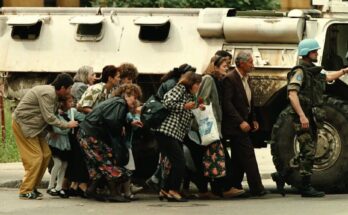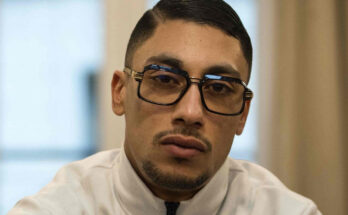A series of negligence and the use of pesticides in a hotel are the most probable cause in the investigation into the death of a family of Turkish-German tourists, including their two children aged three and six. Turkish President Recep Tayyip Erdogan himself intervened, promising to get to the bottom of the matter: “Whose fault it is will be known and there will be no mercy for them.” The case shocked Turkey and reopened the debate on failure to comply with safety standards and the abuse of dangerous chemicals, the same week that a young woman was hospitalized after accidentally ingesting coffee laced with caustic soda.
The Böcek family, originally from Turkey but living in Germany, arrived in Istanbul on November 9 to spend a week on vacation. He stayed at the three-star Harbor Suites hotel, near the historic center of Sultanahmet, and did what every tourist does in the Turkish metropolis: visit places and try food. Kebab, Turkish delight, empanadas, kokoreç (stuffed), stuffed mussels…
At dawn on the 12th, just after eating these shellfish with rice at a street stall, they began to feel nauseous. “In the morning, (parents) Servet and Çigdem Böcek told me that the children had vomited and that the room needed to be cleaned. They told me that they had eaten something on the seafront that had made them sick and asked me for help to go to the hospital,” the hotel’s receptionist, Muhammad C., told the investigating prosecutor. However, according to the newspaper Economy, In The clinic that treated them only gave them intravenous fluids and probiotics and they took them back to the hotel.
That night their situation worsened, so much so that they decided to call the emergency number. Little Masal, three years old, didn’t move. However, when the ambulance arrived, the nurses could not enter the hotel. In security camera images published this Thursday by Turkish media, the father, Servet Böcek, struggles with the outside door, unable to open it for eight minutes.
Muhammad C, who had been called back to work at the reception during the night despite having worked the day shift, admitted that he was the one who left it closed: “When I arrived at the hotel there was a smell of vomit everywhere. At 1am I went out to get some fresh air and came back. At 1.30am I went out to eat something at the kebab shop next door. I closed the door so the thieves wouldn’t get in. When I came back I saw the ambulance.” Masal and his six-year-old brother Kadir died that night. His mother, two days later. The father, this Monday.
At the beginning all suspicions were focused on possible food poisoning and all the places where the Böceks had eaten were traced: the mussel seller, the kokoreçthe owner of a Turkish delight shop and the owner of a bar were arrested and samples were taken at their businesses.
But the preliminary toxicological report of the Institute of Forensic Medicine, published on Tuesday, has overturned the investigations: the samples taken “lead one to think of environmental chemical poisoning”. And on November 10, hotel manager Hakan O. received a complaint about the presence of insects in room 101 and instructed an employee to notify a pest control company.
The next day, while the Böceks were walking and eating mussels in the picturesque Ortaköy neighborhood on the shores of the Bosphorus Strait, exterminator Dogan C., from the DSS Ilaçlama company, came to the hotel and sprayed two different chemicals in room 101, as well as spreading anti-cockroach gel in several rooms. According to Dogan C. in his deposition, the bathroom door and ventilation hole were sealed with duct tape and he said the room would not be used for two or three days. Neither Dogan C. nor the owners of the company had any specific certification or preparation to carry out their work, as they acknowledged before the Prosecutor’s Office.
The report from the Institute of Forensic Medicine, cited by the ANKA agency, claims that one of the chemicals found could be aluminum phosphide, used as a pesticide against insects and rodents in agricultural warehouses. This chemical substance, which has already caused accidental deaths in several countries, including Spain, is dangerous because, when it reacts with humidity, it releases a very toxic gas called phosphine.
Room 202, where the Böceks were staying, was one floor above room 101 and it is believed that gases could have reached it through ventilation ducts. In fact, three other hotel guests had to be treated, even though their symptoms are not as severe. In total, 11 people were arrested, of which eight were sent to prison for preventive purposes.
Coffee with industrial detergent
“This event is not the result of an individual mistake or a series of unfortunate accidents. It is part of a larger, structural problem that has to do with the neglect of the functions of public institutions, the collapse of the welfare state and the weakness of supervisory mechanisms”, denounces the engineer and environmental activist Bülent Sik in an article on the Böcek case in the online newspaper Bianet.
Late last month, Greenpeace won a court case forcing the Turkish Ministry of Agriculture to reveal the results of pesticide residue analyzes carried out between 2022 and 2025. Environmental organizations in Turkey have been denouncing the abuse of pesticides and banned chemicals for years.
The other event occurred on Monday when a 26-year-old girl, Ayben Özçilingir Turtura, went to the popular Karaköy neighborhood to have coffee with her friends. When Turtura took his first sip of coffee, he ran to the bathroom to vomit and soon after began having trouble breathing. She was taken to hospital where she was admitted to the intensive care unit.
This is according to the police investigation, cited by the newspaper Soonthe father of one of the bar managers had stored industrial detergents based on caustic soda in several glass bottles. Without realizing it, an employee used the transparent liquid from one of those bottles to make Turkish coffee (which is prepared individually in a jug) thinking it was water and hence the serious poisoning suffered by the young customer.


